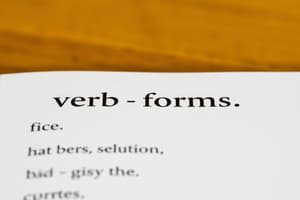Podcast
Questions and Answers
Which is the correct usage of 'is'?
Which is the correct usage of 'is'?
- I is tired.
- We is playing soccer.
- The cat is sleeping. (correct)
- They is friends.
When should 'am' be used?
When should 'am' be used?
- With nouns in plural form.
- With he or she.
- With plural subjects.
- Only with the subject 'I'. (correct)
What is the correct form to express a statement with 'are'?
What is the correct form to express a statement with 'are'?
- He are running.
- I are happy.
- We are at home. (correct)
- She are a teacher.
Which of the following is a correct question structure using 'is'?
Which of the following is a correct question structure using 'is'?
Identify the incorrect statement using 'is', 'am', or 'are'.
Identify the incorrect statement using 'is', 'am', or 'are'.
What is the correct structure for a statement using 'are'?
What is the correct structure for a statement using 'are'?
Which of the following sentences correctly uses 'am'?
Which of the following sentences correctly uses 'am'?
Identify the correct question structure using 'are'.
Identify the correct question structure using 'are'.
Which sentence demonstrates correct usage of 'is' with a singular subject?
Which sentence demonstrates correct usage of 'is' with a singular subject?
What is the correct form to ask if someone is late using 'am'?
What is the correct form to ask if someone is late using 'am'?
Flashcards are hidden until you start studying
Study Notes
การใช้ Is
- ใช้กับประธานเอกพจน์ (singular subjects)
- ตัวอย่าง: He is a teacher. / She is happy.
- ใช้กับคำนามเอกพจน์ (singular nouns)
- ตัวอย่าง: The cat is sleeping.
- ใช้ในประโยคที่แสดงสถานะหรือคุณลักษณะ
- ตัวอย่าง: It is sunny today.
การใช้ Am
- ใช้กับประธาน "I" เท่านั้น
- ตัวอย่าง: I am a student. / I am tired.
- ใช้เมื่อต้องการแสดงอาการหรือสภาพในปัจจุบัน
- ตัวอย่าง: I am playing soccer.
การใช้ Are
- ใช้กับประธานพหูพจน์ (plural subjects)
- ตัวอย่าง: They are friends. / We are going.
- ใช้กับคำที่เป็นเอกพจน์ในรูปแบบของ "you"
- ตัวอย่าง: You are welcome.
- ใช้ในประโยคที่แสดงสถานะหรือคุณลักษณะในรูปพหูพจน์
- ตัวอย่าง: The dogs are barking.
ประโยคคำถาม
- ใช้ is, am, are ในการตั้งคำถามเบื้องต้น
- ตัวอย่าง:
- Is she your sister?
- Am I late?
- Are they coming to the party?
- ตัวอย่าง:
- โครงสร้างคำถาม:
- Is/Am/Are + subject + complement?
ประโยคบอกเล่า
- ใช้ is, am, are ในการบอกเล่าสถานการณ์หรือความจริง
- ตัวอย่าง:
- She is a doctor.
- I am happy.
- We are at the park.
- ตัวอย่าง:
- โครงสร้างประโยค:
- Subject + is/am/are + complement.
Using "Is"
- Used with singular subjects, including:
- He is a teacher.
- She is happy.
- Used with singular nouns:
- The cat is sleeping.
- Used in sentences that express a state or attribute:
- It is sunny today.
Using "Am"
- Exclusively used with the subject "I":
- I am a student.
- I am tired.
- Used to express current state or condition:
- I am playing soccer.
Using "Are"
- Used with plural subjects:
- They are friends.
- We are going.
- Used with the singular form "you":
- You are welcome.
- Used in sentences that express a state or attribute in plural form:
- The dogs are barking.
Question Sentences
- "Is," "Am," and "Are" are used in the formation of basic questions:
- Is she your sister?
- Am I late?
- Are they coming to the party?
- Question structure:
- Is/Am/Are + subject + complement?
Declarative Sentences
- "Is," "Am," and "Are" are used to declare situations or truths:
- She is a doctor.
- I am happy.
- We are at the park.
- Sentence structure:
- Subject + is/am/are + complement.
"To Be" Verb Conjugations
- "Is" is used with singular third-person subjects like "he," "she," "it," and singular nouns.
- "Am" is used exclusively with the first-person singular subject "I."
- "Are" is used with plural subjects like "you," "we," "they" and the singular second-person subject "you."
Declarative Sentences
- Declarative sentences use the structure: Subject + is/am/are + complement.
Interrogative Sentences
- Interrogative sentences use the structure: Is/Am/Are + subject + complement?
Studying That Suits You
Use AI to generate personalized quizzes and flashcards to suit your learning preferences.




